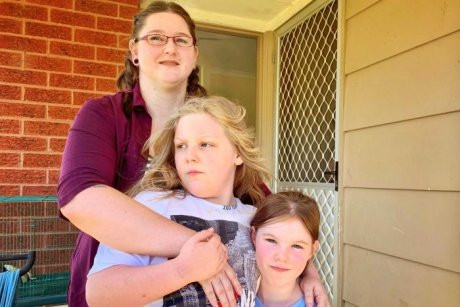
Felix Tarlinton did not have a good experience at school.
"I'm not very good with big crowds," the nine-year old, who lives with autism, told the ABC.
"[My teacher] would send me to this small little corner that I absolutely hated."
Key points:
- 'Gatekeeping' is when students with disability are refused enrolment in schools
- The survey comes just one week before the first hearings of the disability royal commission in Townsville
- Education will be the first subject to be examined
In what is a common story for children living with a disability, teachers at Felix's school in regional NSW — responding to his outbursts and behaviour — often removed him from class.
They sometimes segregated him from other students.
In his last year at school, Felix's teachers reported 20 "negative incidents" including multiple reports of fighting, swearing and an incident where he allegedly attempted to injure a teacher.
Felix's mother Chloe Letica believed some of her son's behaviours might have been avoided if he was offered more support.
She is now home-schooling him.
"It is infuriating," she said. "He has a legal human right to an inclusive education."
Ms Letica believed he could have stayed in his mainstream school if he had an ongoing one-on-one aide in class to help manage his behaviour stemming from his autism, but she said he could not get that full-time support.
Photo Felix's mother Chloe believed her son was not offered the support he needed.
Advocacy group Children and Young People with Disability Australia (CYDA) said the struggles of students such as Felix were not unusual.
Its National Education Survey of families of children with disability — released on Monday — found nearly no progress on improving access to inclusive education.
Of the 505 children with disabilities and their families and carers surveyed, it found 40 per cent of students with a disability had been excluded from events or activities in the last year.
The survey found 21 per cent of students with a disability reported being restrained either physically, chemically, or through commands, and nearly half of respondents said they were bullied.
Families said 12.5 per cent of students with a disability had been refused enrolment.
"We call it school 'gatekeeping'," CYDA chief executive Mary Sayers said.
"What's happening with students with disability is patently unfair."
The survey comes just one week before the first hearings of the Disability Royal Commission in Townsville.
The first subject to be examined will be education.
Analysis: Disability sector ripe for change
"If we don't get it right in education, we can't get it right everywhere else," Ms Sayers said.
"So, [it] is really important and historic that the royal commission is starting with [it]."
Responding to Felix's removal from school, the NSW Department of Education said additional resources were deployed to support him, but it did not identify what form that support took.
It also said more than $288 million was allocated to schools in 2019 to support learning for students with disability.
It said another program, Integration Funding Support, provided $200 million to 10,000 individual students with moderate to high needs.
Working to be 'truly inclusive'
Despite the failures, there are many examples of schools getting it right.
For the Tape family from suburban Brisbane, the experience of eight-year-old Eliza has been a revelation.
Photo Sue Tape said she was "shattered" people were not having a positive experience with their schools.
Eliza lives with Rubinstein-Taybi syndrome, a physical and intellectual disability. She is also non-verbal.
In spite of her disability, her mother Sue Tape said she was thriving at her local mainstream school.
"There's an effort put in to including everyone," Ms Tape said.
"There just seems to be no barrier, and I think that's because Eliza is just so happy to be part of the class."
Ms Tape said she was "shattered" over the results of the CYDA survey.
"There's an opportunity for us to get this right," she said.
"Every child should be able to go to their local school, where their sibling is, where their community is and where their family wants them to be."
from https://mobile.abc.net.au/news/2019-10-28/young-people-with-disability-…;


